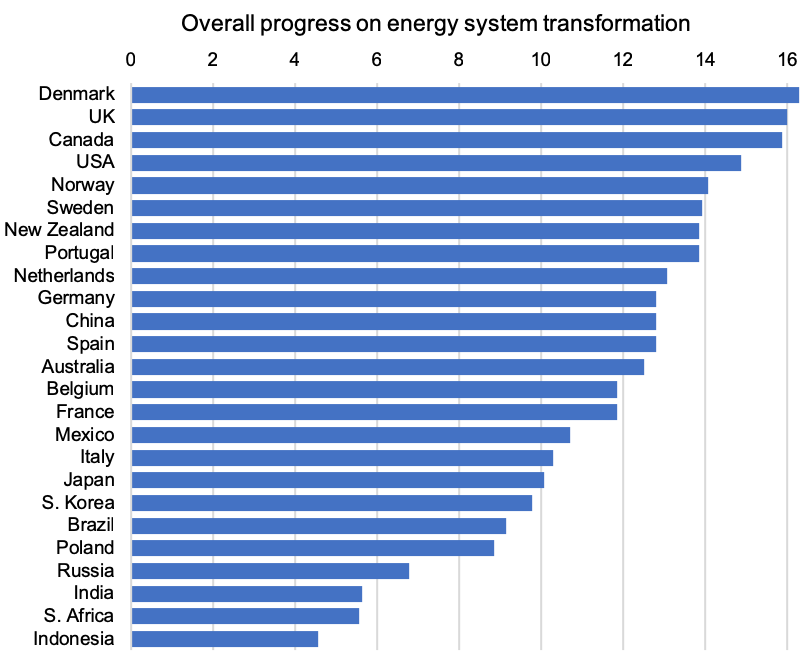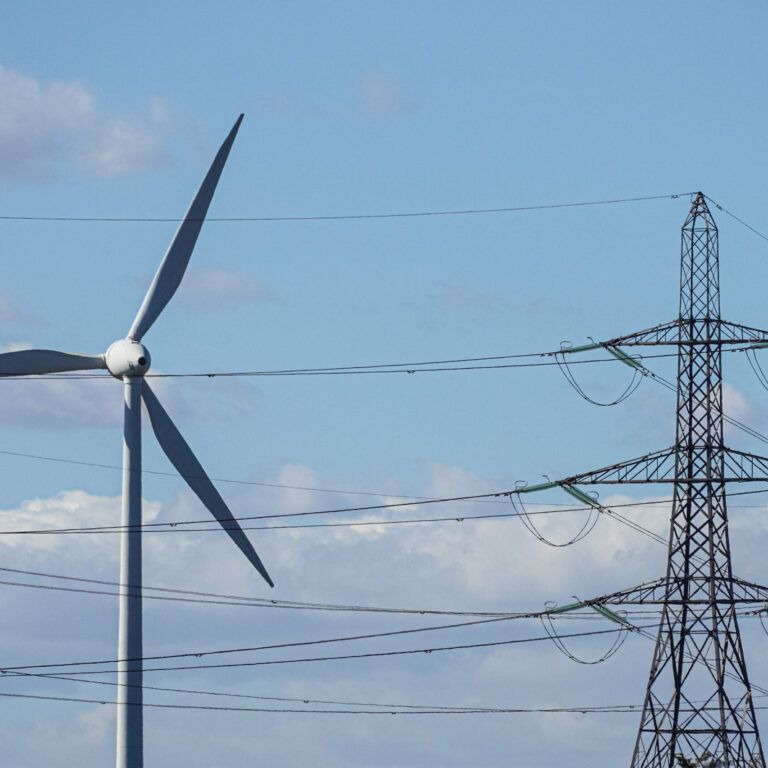-
The UK ranks 2nd in a global league of countries using technologies to limit climate change
-
UK phase out of coal has been faster than any other country in the world, cutting the carbon emissions from its power system by more than twice as much as some other countries
-
However, the UK has no large-scale carbon capture facilities, which are critical to climate targets being achieved
The UK is second only to Denmark when it comes to implementing measures to mitigate climate change, according to a new global energy revolution league table.
In the report Energy Revolution: A Global Outlook, researchers from Imperial College London have assessed 25 countries, covering 80% of the world’s population.
Launched today at the UN climate change conference in Katowice, Poland, the report looks at each country’s performance across five metrics, including:
- Clean power
- Fossil fuels
- Uptake and sales of electric vehicles
- Capacity for carbon storage
- Energy efficiency of households, buildings and transport.
The UK’s carbon price – its charge on greenhouse gas emissions which is stronger than elsewhere in Europe – has led to rapid deployment of renewables and the fastest phase out of coal power, making for world-leading progress in reducing the carbon emissions from power generation.
Whilst most countries have reduced the amount of carbon dioxide produced per kWh of electricity by 100g/ kWh over the last decade, the figure in the UK is more than double that at 260g/kWh.
Uptake of electric vehicles is also among the highest in the UK, which is home to the world’s 5th largest electric vehicle fleet.
However, progress in the UK is being hampered by the fact it lags behind on the provision of large-scale carbon capture and storage (CCS) facilities, needed to limit the harmful greenhouse gases accumulating in the atmosphere.
The research was conducted by Imperial College London and E4tech, facilitated by Imperial Consultants and commissioned by Drax Group.

Figure 1: Ranking of country progress in the energy revolution
Responding to the findings Will Gardiner, Drax Group CEO, said:
“Our global economy is changing and the transition to zero carbon, lower cost energy is vital if countries are to be able to compete.
“At Drax, we’ve converted two thirds of our power station to use biomass instead of coal, transforming the business to become Europe’s biggest decarbonisation project and helping to make the phase out of coal in the UK the fastest in the world. But we want to do more.
“We’re piloting the first Bioenergy Carbon Capture and Storage (BECCS) project of its kind in Europe – which could make Drax the world’s first carbon negative power station. Removal of carbon from the atmosphere is vital if we are to meet our climate targets.”
Commenting on his team’s findings, Imperial’s Dr Iain Staffell, said:
“We researched how the world is progressing on uptake of the five key technologies and measures needed to limit climate change to 2 degrees Celsius. This reveals Denmark, UK and Canada to be world leading.
“Progress across these five areas is very mixed. Great strides are being made in cleaning up global electricity generation, and renewable capacity is increasing rapidly all around the world. Electric vehicles are also rapidly taking off, but still have only reached a 5% share of new cars sold in two countries. Improving the efficiency of our homes and industries needs urgent effort. Significant investment in Carbon Capture and Storage will also be needed if it is to contribute to limiting climate change, as only 6 countries are currently demonstrating this technology at scale.”
Energy and Clean Growth Minister Claire Perry, said:
“This confirms the UK’s position as a world leader in decarbonising the economy – phasing out coal as we move to a greener, cleaner energy system with record levels of energy from renewables. We have also led the way in transitioning to low emission vehicles and today one in five electric vehicles sold in Europe is manufactured here in the UK.
“But we’re determined to do more to reduce our emissions. That’s why last week we published plans for the UK’s first carbon capture, usage and storage project to be operational in the mid-2020s with the ambition of potentially rolling out this cutting-edge technology at scale in 2030s.”
Commenting on the findings, Alyssa Gilbert, Director of Policy and Translation from Imperial’s Grantham Institute, said:
“Ahead of COP24, this research provides a useful barometer of the progress countries are making in their uptake of technologies such as renewable power, Carbon Capture and Storage, electric vehicles, and energy efficiency measures.
“The findings also highlight the benefit of supportive government policies in limiting climate change to 2 degrees Celsius.”
Calls for Carbon Capture and Storage
The UK lags behind on roll-out of Carbon Capture and Storage (CCS) technologies. Only Norway, Canada, Australia, USA, Brazil and China currently have facilities to capture carbon dioxide from the atmosphere at scale, and worldwide only 2.5 kg of CO2 per person per year is captured, versus an average annual carbon footprint per person of 5 tonnes of CO2.
Storage resources are not the barrier to deployment. The International Energy Agency estimates that 100 billion tonnes of carbon dioxide must be stored underground by 2060 to limit temperature rise to 2°C for least cost. USA alone has estimated storage capacity for over 100 trillion tonnes of carbon, and the UK has capacity for 70 billion tonnes.
Instead the barriers are political. USA benefits from tax credits that have been in place since 2008 for geological storage of carbon and China’s last two Five Year Plans have included specific goals to develop CCS. With most estimates outlining that significant CCS deployment is needed to limit the impact of climate change, the UK needs large scale deployment of the technology to remain a world leader in environmental progress.
Wider report findings
- The UK and Denmark lead global efforts to move away from coal for power generation. But many Asian countries including Indonesia, India and Japan are increasing their reliance on fossil fuels. The countries with the cleanest power systems – Norway, France and New Zealand rely heavily on hydro or nuclear power.
- The UK is home to the world’s 5th largest electric vehicle fleet, and 1 in every 40 new cars sold in the UK is electric. But Norway leads by far in terms of uptake of electric vehicles with half of all its cars now electric. Norway also leads in installation of car charging points with one charger for every 500 people, in the UK there is one charger for every 5,000 people.
- Europe remains the global leader in energy efficient housing. Residential homes in Portugal, Germany, Netherlands and the UK are among the most energy efficient. By comparison, rising incomes mean China and South Africa are increasing their energy intensity.
- The study shows that rising incomes across the BRIC economies are displacing public transport as populations with rising disposable incomes move towards private vehicles. As a result, China, India and Indonesia have increased their energy consumption per person in transport by over 50% over the last decade.

Figure 2: Current large-scale carbon capture capacity (in kg/CO2 per person per year)
ENDS
Media contacts
Rachel Adeyinka
E: radeyinka@stonehaven.uk.com
T: +44 (0)7940 177 999
Josh Harvey
E: jharvey@stonehaven.uk.com
T: +44 (0)7714 162 783
Editor’s Notes
- Energy Revolution: A Global Outlook was commissioned by Drax Group and conducted independently by academics from Imperial College London, and consultants from E4tech, facilitated through the College’s consultancy company – Imperial Consultants.
- View and download the report: https://www.drax.com/uk/wp-content/uploads/sites/8/2018/12/Energy-Revolution-Global-Outlook-Report-Final-Dec-2018-COP24.pdf
- The measures used to assess the state of transition in the global energy system to achieve climate targets are:
- Clean power: low carbon electricity generation, including renewables, biomass and nuclear
- Phase-out of fossil fuels
- Electrification of passenger vehicles
- Carbon Capture and Storage
- Improved efficiency across the economy
- Country selection was based on including all G7 and BRICS (Brazil, Russia, India, China and South Africa) countries. The remaining countries were selected based on their membership to the IEA/OECD and/or their geographical location. Some countries could not be included due to limited data availability.
- The results presented are based on data collected from other sources, as opposed to internal modelling.
About Drax
Drax Group plc plays a vital role in helping change the way energy is generated, supplied and used. Its 2,300-strong staff operate across three principal areas of activity – electricity generation, electricity sales to business customers and compressed wood pellet production.
The Group includes:
Drax Power Ltd, which operates the largest power station in the UK, based at Selby, North Yorkshire and supplies six percent of the country’s electricity needs. The energy firm converted from burning coal to become a predominantly biomass-fuelled electricity generator. Drax is the biggest renewable generator in the UK and the largest decarbonisation project in Europe.
Haven Power, based in Ipswich, supplies electricity to large Industrial and Commercial sector businesses.
Opus Energy, based in Oxford, Northampton and Cardiff, provides electricity and gas to small and medium sized (SME) businesses.
Drax Biomass, is based in the US and manufactures compressed wood pellets produced from sustainably managed working forests, supplying fuel used by Drax Power Station in North Yorkshire to generate flexible, renewable power for the UK’s homes and businesses.
For more information visit www.drax.com/uk
Imperial Consultants provide access to over 4,000 research-active expert academics and Imperial College London’s state of the art facilities to deliver innovative solutions to meet the business needs of industry, government and the third sector. Founded in 1990, Imperial Consultants is the wholly owned consultancy company of Imperial College London.
E4tech is a strategic energy consultancy. Founded in 1997 the firm provides technically informed insight on the energy transition and its implications on companies, governments and investors.












